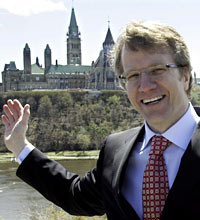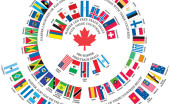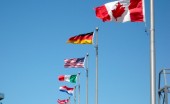Re Ian Bremmer 'Could third-party candidates upend the 2024 US election?' 3 April The current political movement in the USA…
Wednesday Night #1292 – after the Liberal Leadership convention
Written by Diana Thebaud Nicholson // December 6, 2006 // Arts and culture, Canada, China, Climate Change, Environment & Energy, Health & Health care, Herb Bercovitz, Immigration/migration, Local news & events, Markets, Politics, Public Policy, Québec, Reports, Robert Galbraith, Wednesday Night Authors, Wednesday Nights // Comments Off on Wednesday Night #1292 – after the Liberal Leadership convention
Introduction
The crowded room was pervaded by an atmosphere of genial good humour in contrast to the proposed discussion of the ‘dismal science’. Using the presence of Peter Trent as the perfect segue, Diana mentioned that during the first week of January, Infinitheatre will perform Prescription for murder set in Westmount and cleverly featuring cameo appearances by four individuals – of whom she is one – in the role of Mayor of Westmount. Robert Galbraith is the official photographer for this unprecedented event.
MacKay Smith presented his newly published book “Montreal’s Sherbrooke Street the Spine of the City“, a wonderful history of the street and our city, which is available at all major bookstores and sales are brisk.
The Liberal Leadership Convention (see CBC’s in-depth coverage)
(see Robert Galbraith’s photo coverage at Liberal Convention)
Money, power and influence can be powerful currencies in determining the path of nations and individuals. However, the recent Liberal Party of Canada leadership convention (see) demonstrated the enormous value of the trading stamp as a currency to act as a counterbalance to money, power, influence and charisma. Stéphane Dion emerged as leader of that party, much to the surprise of his opponents whose trading stamps appeared to be used as much for personal gain as for the good of the country. Of course, it would be naïve to believe that there were no votes traded for the fulfillment of personal ambitions, but for the present at least, the influence and power of the traditional party elite appears to have been broken thanks, in part, to a renewed interest in politics by a generation of youth that had previously shunned mainstream politics. M. Dion appears to be listening.
[Editor’s note: Breaking with our usual format, we include here a number of quotes to give the full flavour of the animated exchange.
- The members took the party away from the party elite – party insiders were angry and stunned
- The quality of all the candidates – their credentials – was outstanding, far better than anything we see south of the border
- I believe that the real kingmaker was David Orchard; he [Dion] would have been such a distant fourth without them [the delegates Orchard personally brought to Dion]
- I saw something that was wonderful, the enormous amount of enthusiasm on the part of the informed young people that we have not seen for a long time – there was an electric quality to the campaign and to the Convention
- Every campaign is run by youth because they are the only ones who have the energy [or the time!]
… the opportunity to come together with [delegates from all over the country] over things that you believe really matter- I was looking around the room seeing a group of about 25 people, all under the age of 30, essentially running this man’s policy and communications. I think it has been a great renewal that belongs to all of us, not to one particular candidate
- I saw these guys at work, young people, a new league coming out in Canada, not the old- boy system
- As an outsider, I wonder if we didn’t trade one political élite for another
How should leaders be elected – let me count the ways
Some Wednesday Nighters believed that all party members should elect a leader directly, others that the delegates should be committed to vote for the candidate selected at the riding level. The problem with the former is that the number of members at any one time, is a function of the ability of a particular candidate or interest group to sell temporary memberships, while the latter prevents the delegate from listening, representing and making intelligent choices, thus frequently being forced by the rules to support an unelectable candidate as has, at times, happened in the United States. The direct telephone vote by all members has recently led to the election of André Boisclair as Parti Québécois leader, a choice not considered wise by many electors of various political stripes.
The Québec government and the physicians – when will patients count?
The current dispute between Québec Physicians and Surgeons and the government is not to be taken lightly. The myth of Francophone practitioners being held hostage here because of language is rapidly being exploded. For some years now, the Université de Montréal medical school has been ranked number one in Canada and its graduates are in demand across the country and around the world. If at all possible, it will take many years to re-establish the physician/patient balance here, especially in an increasingly aging population. Although currently in the news, this dispute is a microcosm of problems that exist throughout publicly funded networks such as education, health and transportation.
Some countries get it (managing the economy) right
Norway’s Government Pension Fund (formerly Petroleum Fund) resulting from the country’s affluence in the form of North Sea oil is being regarded by many as evidence of impressive Nordic wisdom. Certainly, that country’s policy of investing the proceeds worldwide in a public portfolio is prudent and will serve to enrich that country in the foreseeable future. This is similar to what Albert a has done, but Norway has the advantage of the state owning the oil and can distribute the revenue evenly across all inhabitants of the country, does not have to share with the European Union, and that it has a stable government not likely to change its policies. Other countries with no oil resources have succeeded in a similar manner. Eire, while not an affluent country, is becoming more affluent at an impressive rate by becoming a haven for head offices of companies not necessarily operating in that country. Switzerland has succeeded for years in earning money with few resources. Slovakia attempted to emulate Eire but did not succeed because while it did indeed attract foreign investors, the benefits were disproportionately concentrated around Bratislava and the area close to the Austrian border, with none to the outlying regions. Come the next election, a new government was elected. Thus, the key to the success enjoyed by Eire lies in the stability of its government and policies.
The market
The stock market continues to reflect a healthy economy. There could be a problem in December because of possible profit taking into January. We are minutes away from 13,000 in the U.S. by the end of the year and we are heading for 14,000 before it reaches its peak. The markets look a bit stretched, but it does not look as though 2007 will be problematic for the U.S. The rest of the world is doing quite well economically. There are some pretty good opportunities and things should move generally higher. The energy sector and financials are attractive. The Canadian (mining) story is well known across the world and should continue to do pretty well. Singapore is benefiting from the increasing pollution in Hong Kong; some of the expat community is moving to Singapore.
It is noteworthy that pollution in China is a problem now recognized by the government. (Tom Friedman has been writing about this) ; if China does not start to address its environmental problems, its growth will be slowed. Asia is booming, most compelling for long-term investment. People are looking to countries like Vietnam and Mongolia.
Global warming
At the recent Climate Change Conference in Nairobi, a number of extremely important development issues were sidelined by the very open split between the Group of 77 plus China and the U.S.-Canada-Australia coalition. The Millennium Development Goals are a unifying point for all of the parties, however there are conflicting views on how to reach the goals, two of which are advocated by Jeffrey Sachs and William Easterly, formerly of the World Bank ( Why Hayek Was Wrong: Sachs Responds to Easterly)
A highly recommended new book is Heat: How to Stop the Planet From Burning by George Monbiot of The Guardian. Of particular interest is the Foreword to the Canadian edition. He notes how poorly Canada is performing in emission control. He presciently forecasts the hopelessly inadequate “Made in Canada Solution” introduced by the Conservative government whose “solution” will require that government to be elected to power eleven times before the provisions come into effect.
Alberta will be an interesting place to watch, with the change in government philosophy in that province and the looming problem of lowering the water table in order to pump oil out of the tar sands
Of all the leadership candidates, it is  Gerard Kennedy who has taken the strongest position on the flaws of Canadian immigration policy, citing the immigrant success gap and pointing his finger at the oft-discussed [at Wednesday Night] problem that Canada makes every effort to attract the best and the brightest but then doesn’t make use of their skills and talents. One cause for optimism is that the Québec government is beginning to introduce equivalency programs, allowing talented professionals to earn their equivalency relatively quickly and painlessly. With the Liberal Party leadership race on our mind, we sometimes try to predict the outcome of the concurrent mid-term elections in our neighbour to the south, where despite the evidence of a great deal of disaffection with the current Republican Congress – this may possibly dissipate when the votes are cast, or be expressed by refraining from voting. Will the Republicans’ ability to raise campaign funds overcome the public’s disenchantment with the Party, whether over the war in Iraq, or over morality issues like the Foley case? The days/months ahead will certainly be of interest to all.
Gerard Kennedy who has taken the strongest position on the flaws of Canadian immigration policy, citing the immigrant success gap and pointing his finger at the oft-discussed [at Wednesday Night] problem that Canada makes every effort to attract the best and the brightest but then doesn’t make use of their skills and talents. One cause for optimism is that the Québec government is beginning to introduce equivalency programs, allowing talented professionals to earn their equivalency relatively quickly and painlessly. With the Liberal Party leadership race on our mind, we sometimes try to predict the outcome of the concurrent mid-term elections in our neighbour to the south, where despite the evidence of a great deal of disaffection with the current Republican Congress – this may possibly dissipate when the votes are cast, or be expressed by refraining from voting. Will the Republicans’ ability to raise campaign funds overcome the public’s disenchantment with the Party, whether over the war in Iraq, or over morality issues like the Foley case? The days/months ahead will certainly be of interest to all.



